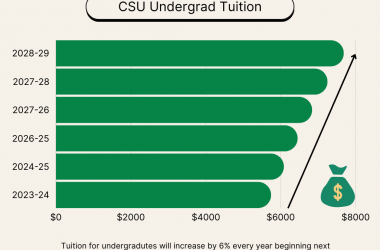Associated Students Inc. will hold a special election in February for a referendum that would raise the ASI fee by $16 per semester.
The referendum will also include a provision that would base future ASI fee increases on the Consumer Price Index (CPI) instead of allowing students to vote on increases.
The CPI is based on inflation, so it rises and falls with the economy, according to the Bureau of Labor Statistics. To ensure that the ASI fee keeps pace with inflation, the fee would be tied to the CPI and adjusted accordingly every three years, according to the resolution.
“After every three years, ASI would review a fee increase,” ASI Executive Director Richard Haller said. “If it’s warranted, they would increase the fee by whatever percent the CPI went up.”
The ASI Senate unanimously passed a resolution in support of the referendum on its first and final reading last week. The resolution has been forwarded to the Cal State Long Beach Student Fee Advisory Committee and approval to place the referendum on the special-election ballot has been granted.
ASI Vice President Jonathon Bolin said they chose to place the referendum on a special election ballot rather than the spring 2014.
“We probably don’t want to have it on the ballot during election season for ASI, because no one’s going to want to run on an ASI fee, obviously,” Bolin said. “We want to have it on a different ballot in February, before elections … before people start campaigning and everything so [ASI] can back it as a group.”
At a November ASI Senate meeting, Haller gave a budget report that highlighted the multi-million dollar organization’s budget deficit of approximately $750,000, which accumulated from required maintenance and operating expenses.
Haller said that the deficit could be resolved with either a $16 ASI fee increase or cuts to current ASI programs and services.
According to Haller’s report, the largest contributing factor for the deficit is inflation. The ASI fee, which is currently $44 per semester, has not increased since 2000.
“It’s just an industry norm,” Bolin said. “The reason why we have to raise this fee is because of inflation. We are raising the fee by exactly how much we lost in buying power.”
In order to have the same buying power that the $44 fee provided ASI in 2000, ASI would need to institute a $58.02 fee, according to numbers from the Bureau of Labor Statistics.
Some students, like junior kinesiology major Gilbert Villegas, said they support a fee increase as well as the CPI, but don’t like how the election might be held.
“As far as the fee increase and CPI goes, I’m ok with [it],” Villegas said. “But as far as not being able to vote for the fee increase and CPI separately, I think that’s stupid.”
Freshman math major Eduardo Cataoanolivares said he thinks students should be able to vote on fee increases as they are proposed.
“I think just vote it in,“ Cataoanolivares said, “because [then] everyone gets to decide on it.”
Sophomore journalism major Justine de la Rosa said she supports the fee increase, but would prefer to always leave it up to a student vote.
“I do support the fee increase because I think that especially at this school, the student organizations do make the most because they do a lot … But I think that the choice should still be given to students because, in the end, it’s our campus and it’s our school, and what’s going on affects us.”



